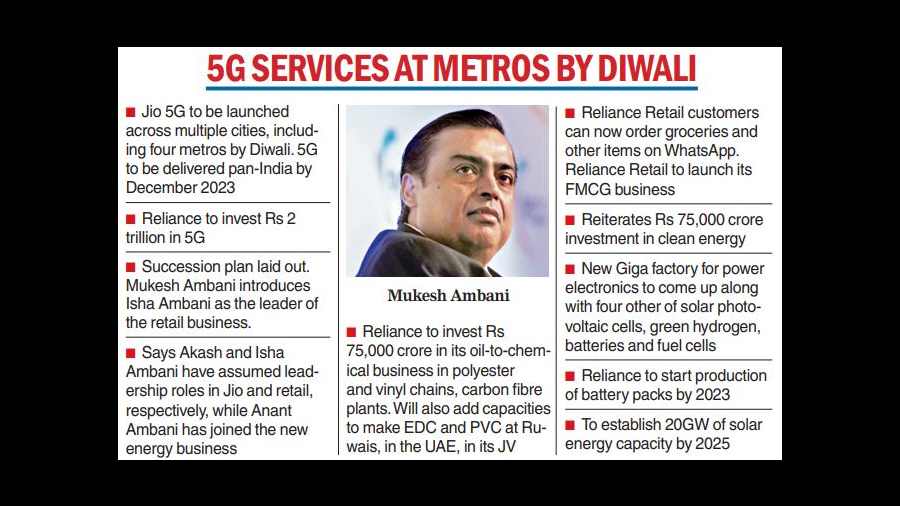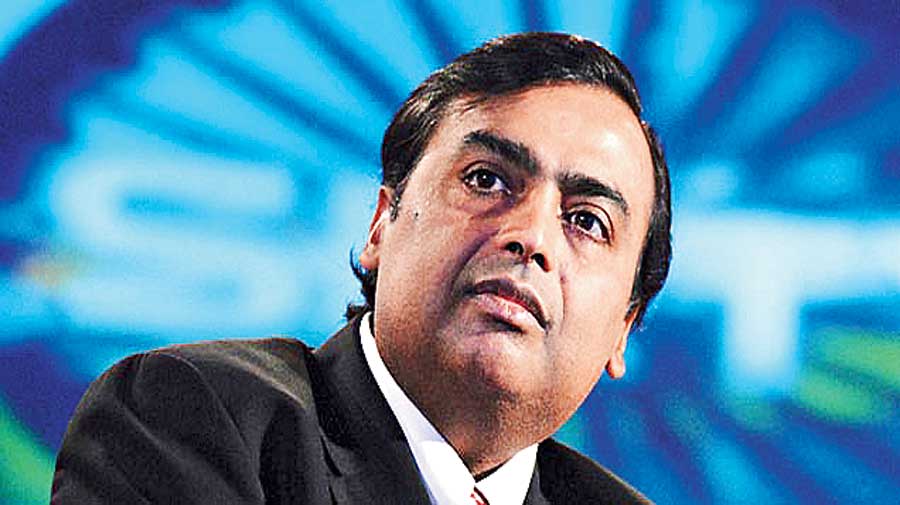Reliance Industries Limited (RIL) will splash out Rs 2 lakh crore (trillion) in 5G rollout as chairman Mukesh Ambani announced a whopping Rs 3.50 lakh crore in capex at the company’s 45th AGM held on a virtual mode on Monday.
Reliance laid out a lavish 5G spread that envisages the service in every corner of the country within an astonishing 18 months by December next year, with 5G available in the four metros this Diwali. The company will invest Rs 75,000 crore in its core oil-to-chemical (O2C) business while new energy as previously announced will account for the rest of Rs 3.5 lakh crore investment — which is another Rs 75,000 crore.
RIL is also prepared to double its bet on new energy if it is proved the business needs more scale. The key highlight of Ambani’s speech was the bet on 5G just after buying spectrum worth Rs 88,078 crore in the recent auction. The RIL chairman disclosed that Reliance is committed to making India the largest data-powered economy in the world and that it is planning to introduce several game-changing facilities along with 5G.

He claimed that most operators are deploying a version of 5G, called “Non-Standalone 5G’’ — a 5G radio signal delivered over an existing 4G infrastructure. Jio will deploy the latest version of 5G, called “Stand-Alone 5G’’, which Ambani said has zero dependencies on its 4G network.
He said that Jio 5G would be rolled out within the next two months (by Diwali) across key cities, including the metropolises of Delhi, Mumbai, Calcutta and Chennai. “Subsequently, we plan to increase the Jio 5G footprint month after month. By December 2023, which is less than 18 months from today, we will deliver Jio 5G to every town, every taluka, and every tehsil of our country,’’ he noted.
Ambani said Reliance Jio has partnered Qualcomm to develop 5G solutions for India, which can be taken to the rest of the world. In a presentation, Akash Ambani who heads the digital business disclosed that Jio 5G will bring wireless broadband wherein customers will get fibre-like speeds over the air without any wires coming into their homes. Reliance is calling this “JioAirFiber’’.
“With JioAirFiber, it will be really easy to quickly connect your home or office to gigabit-speed Internet. We have developed a JioAirFiber Home Gateway, which is a wireless, simple, single-device solution. Get it, plug it in, turn it on, and that’s it. You now have a personal Wi-Fi hotspot in your home, connected to ultra-highspeed internet using True 5G,’’ Ambani said.
Akash said they will also bring out a virtual PC which will be hosted in the cloud. Jio is calling this concept “Jio Cloud PC’’. According to the company, customers can save expenses incurred on computers and its facility will be super-affordable. Ambani also divulged massive expansion plans in its core O2C segment which generated revenues of Rs 5 lakh crore in the previous fiscal.
The plan is to invest Rs 75,000 crore and expand capacities in existing and new value chains. In the polyester value chain, RIL plans to build one of the world’s largest single-train PTA plant of 3 million tonne capacity at Dahej and a one million tonne PET plant there. Both these will be targeted for completion by 2026. RIL is also reinvesting in polyester filament yarn (PFY) and polyester staple fibre (PSF). The polyester expansion with capacity of over one million tonne is expected to be completed in phases by 2026.
Ambani disclosed that consistent with its vision for new materials, RIL will build in phases India’s first and one of the world’s largest carbon fibre plants at Hazira with a capacity of 20,000 tonnes based on acrylonitrile feedstock. On new energy, Ambani reiterated earlier plans of investing Rs 75,000 crore in various segments such as solar energy, batteries and power electronics. One of the targets is to have solar energy capacity of 100GW by 2030, he said.










